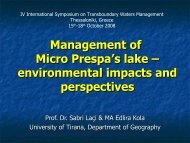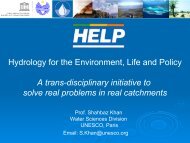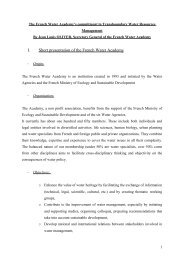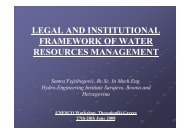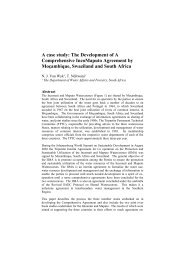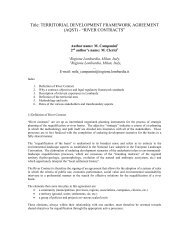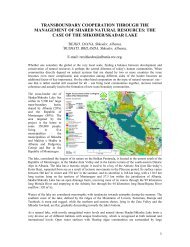An Appraisal of Shared Water Dispute Resolution ... - inweb
An Appraisal of Shared Water Dispute Resolution ... - inweb
An Appraisal of Shared Water Dispute Resolution ... - inweb
Create successful ePaper yourself
Turn your PDF publications into a flip-book with our unique Google optimized e-Paper software.
Ethiopia. If this attempt is further strengthened, there is a good possibility <strong>of</strong> untying, if not breaking, the<br />
stalemate. In the opinion <strong>of</strong> the author, three factors are responsible for the change <strong>of</strong> heart and minds by<br />
the Egyptians: (a) the pressure from the Third Parties, such as the World Bank and UNDP, to cooperate,<br />
(N.B. the World Bank played a central role in the establishment <strong>of</strong> the NBI), (b) the threats from upstream<br />
riparian states, particularly Ethiopia, to harness the Nile waters unilaterally (c) the appointment <strong>of</strong> a wise,<br />
well-experienced and pragmatic Minster <strong>of</strong> <strong>Water</strong> in Egypt, Mr. Abu Zeid, who has made lots <strong>of</strong> efforts in<br />
changing the attitudes <strong>of</strong> hard-core elements in Egypt.<br />
The NBI and ENTRO have created platforms for discussions and dialogues. In effect, the tense relations<br />
between upstream and downstream countries have eased in the past one decade. This doesn’t however<br />
mean that they have a rosy relationship. In spite <strong>of</strong> the presence <strong>of</strong> a basin-wide forum, i.e. NBI, and some<br />
strides made in one or the other basin-wide projects, the Egyptians seem to stick to their water security<br />
policy and the adoration <strong>of</strong> the status quo. Unless there is a change <strong>of</strong> heart and mind on these sticking<br />
issues, it becomes very difficult to build confidence and trust between Ethiopia and Egypt. Be that as it<br />
may, the fact that there is a Nile-based Organization in Entebbe, Uganda is by itself a virtue and a plus on<br />
the balance sheet. The establishment <strong>of</strong> the NBI has also kindled some hope for the poor folks inhabiting<br />
the basin with expectations to improve their well-being through irrigation agriculture, watershed<br />
management and access to power. The other added advantage <strong>of</strong> the NBI is its creation <strong>of</strong> employment<br />
opportunities for many basin-based pr<strong>of</strong>essionals. The NBI and its affiliates have also funded a number <strong>of</strong><br />
studies on socio-economics, hydrology, institutions and water technology. As a result, quiet a sizeable<br />
number <strong>of</strong> valuable research outputs have been produced and published.<br />
The rationale behind the establishment <strong>of</strong> the Eastern Nile Technical Regional Office (ENTRO) is to come<br />
up with concrete transboundary or in-country projects in the Eastern Nile, i.e. in Egypt, Ethiopia and the<br />
Sudan. ENTRO is preparing a number <strong>of</strong> projects related to watershed management, power production<br />
and pool, irrigation and what they call ‘Joint Multipurpose Projects’. The latest information the author has<br />
about the projects is that some are at the pre-feasibility stage, others at feasibility and some more at the<br />
design stage. The power pool deal between Ethiopia and the Sudan seems to be on the right track while for<br />
unknown reason the much awaited Baro-Akobo Multipurpose Project is derailed. Dam sites within<br />
Ethiopia have also been identified, e.g. at Koga, to irrigate 7000 hectares <strong>of</strong> land and to improve<br />
watershed management on 22,000 hectares catchment area. Sadly, this dam that was scheduled to be<br />
completed by November 2006 and to supply irrigation water by the end <strong>of</strong> January 2007 is not yet<br />
completed. According to some sources, currently only 90% <strong>of</strong> the dam works and 15% <strong>of</strong> the irrigation and<br />
drainage infrastructure are complete. Best estimates indicate that the dam construction will not be<br />
completed before March 2009 and the irrigation and drainage infrastructure before 2011.<br />
The major problem bedeviling the NBI and ENTRO is the immense time it is taking to translate plans and<br />
projects on the ground. So far, one could see little or nothing on the ground. This is adding frustration not<br />
only to the impoverished people living in the hitherto disadvantaged countries like Ethiopia but also to<br />
elites and skeptics alike. Everybody knows that hydraulic projects require quite a significant time to get<br />
grounded. However, it is inconceivable and unbearable to see little or nothing coming out <strong>of</strong> the NBI in the<br />
past ten years and from ENTRO in the past seven years. The picture will become complete if one adds the<br />
failure to come up with a permanent institution through the ratification <strong>of</strong> the Legal and Institutional<br />
Framework that started way back in 1997. Such a lacuna begs a number <strong>of</strong> questions: Is the NBI and its<br />
<strong>of</strong>fshoots, ENTRO, NELSAP, time-buying exercises? Why are the Egyptians still adamant when it comes to<br />
rescinding their water security policies? Why are they still considering the colonially-induced Treaty <strong>of</strong><br />
1929 and the bilateral treaty they made with the Sudan in 1959 as sacrosanct?<br />
The catch-word ‘win-win’ is easier said than done. It clings good to the ear but complicated to translate it<br />
into realty. How can upstream states think <strong>of</strong> ‘win-win’ under a situation where (a) the Egyptians are<br />
interested to get their water quota from the Nile based on the 1959 Agreement in an uninterrupted manner<br />
(55.5 billion m3/year), (b) the Egyptian ‘water security’ policy remains intact through the maintenance <strong>of</strong><br />
the status quo ante, (c) the out-<strong>of</strong>-basin transfers at Toshka and El-Salaam canals are either operational or<br />
on-going. It is incumbent upon the Egyptians to revise or annul these age-old positions if we aspire to<br />
create ‘win-win situations’ in the basin. In addition, no specific methodology has been developed to<br />
quantify benefits and costs in the utilization <strong>of</strong> Nile water resources. Neither is it easy to develop a benefit<br />
2



